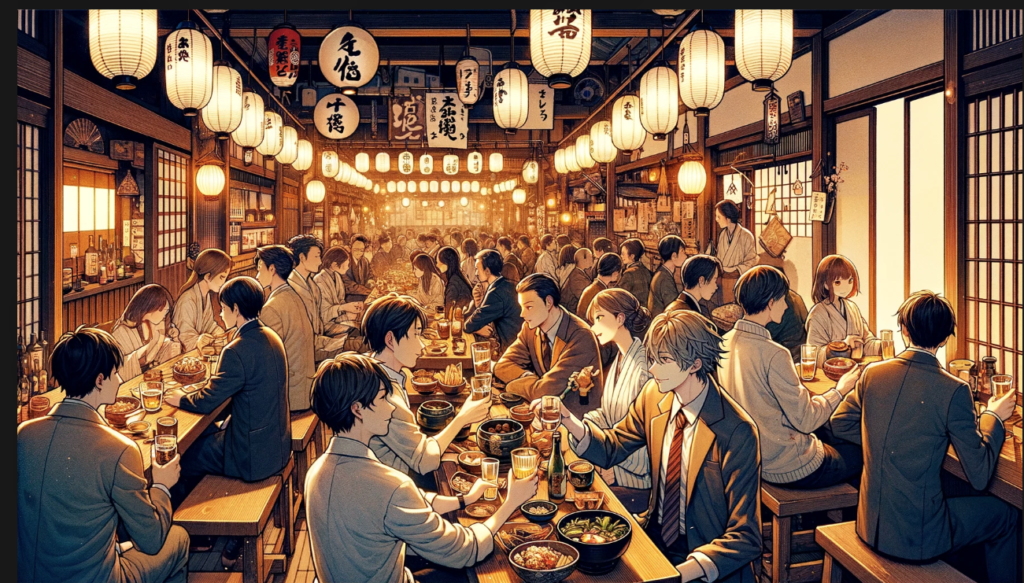
Lesson 42 Drinking and Socializing
Topic Question: What are the social norms surrounding drinking and socializing in Japan?
No. 1: Introduction– First, try answering the question yourself.
The instructor will provide advice on vocabulary, grammar, and expression corrections.
Sample Answer – Let’s read aloud. Instructor will check your pronunciation and accent.
In Japan, drinking and socializing play significant roles in fostering relationships and facilitating communication. However, these activities are governed by a set of social norms that reflect the country’s culture of respect, hierarchy, and harmony. One of the fundamental norms involves the practice of pouring drinks for others, rather than for oneself, which symbolizes care and respect. It is also customary to wait until everyone’s drink is served and a toast, or “kampai,” is made before starting to drink. Additionally, paying attention to the needs of others, such as refilling empty glasses, is considered polite. The respect for hierarchy is evident in how younger people are expected to pour drinks for their elders or superiors. While drinking is an integral part of Japanese social life, there is an unspoken understanding that one should drink responsibly and not cause discomfort to others. These norms not only facilitate smoother social interactions but also reinforce social bonds and respect among individuals.
No. 2: Vocabulary Building- 5 Words to Learn and Their Meanings
Pronounce the Words Correctly (Pronunciation Training) + Make Sentences Using the Words Instantly
- Hierarchy (階層, kaisō): A system in which members of an organization or society are ranked according to relative status or authority.
“Understanding the hierarchy within a group is crucial when socializing and drinking in Japan.”
- Harmony (調和, chōwa): The quality of forming a pleasing and consistent whole.
“Japanese social norms emphasize harmony, ensuring that everyone feels included and respected during social gatherings.”
- Toast (乾杯, kanpai): A call to a gathering of people to raise their glasses and drink together in honor of a person or thing.
“Saying ‘kanpai’ together before drinking is a tradition that unites everyone at the table.”
- Responsibly (責任を持って, sekinin o motte): In a way that shows or takes responsibility.
“Drinking responsibly is a valued aspect of socializing in Japan, with an emphasis on not overindulging.”
- Discomfort (不快, fukai): A feeling of slight pain or physical or mental unease.
“It is important to drink in such a way that does not cause discomfort or inconvenience to others.”
No. 3: Key Idiom and Example Sentences
“Mind your manners” – This phrase reminds people to be aware of and follow social rules or norms to ensure respectful interactions.
“In Japanese social and drinking settings, it’s essential to ‘mind your manners,’ showing respect through actions like pouring drinks for others.”
“Being mindful of your manners, especially in how you handle drinking, reflects well on you and your respect for Japanese culture.”
No. 4: Discussion and Exchange of Opinions on the Sample Answer
Instructor: How do these social norms around drinking and socializing reflect broader aspects of Japanese culture? What challenges might foreigners face when trying to navigate these norms?
Student: [Opinions of students]
No. 5: Free Discussion on the Topic
Let’s discuss the importance of social gatherings and drinking in professional settings in Japan. How do these norms facilitate networking and the building of work relationships? Consider how these practices may have adapted or changed in modern times, especially in more international or diverse workplace settings. Additionally, explore the balance between traditional norms and the need for personal boundaries and health considerations. How do individuals and society at large manage these dynamics? What can people from other cultures learn from Japanese socializing and drinking norms?







